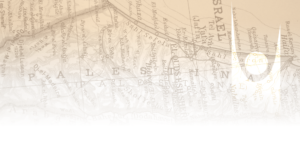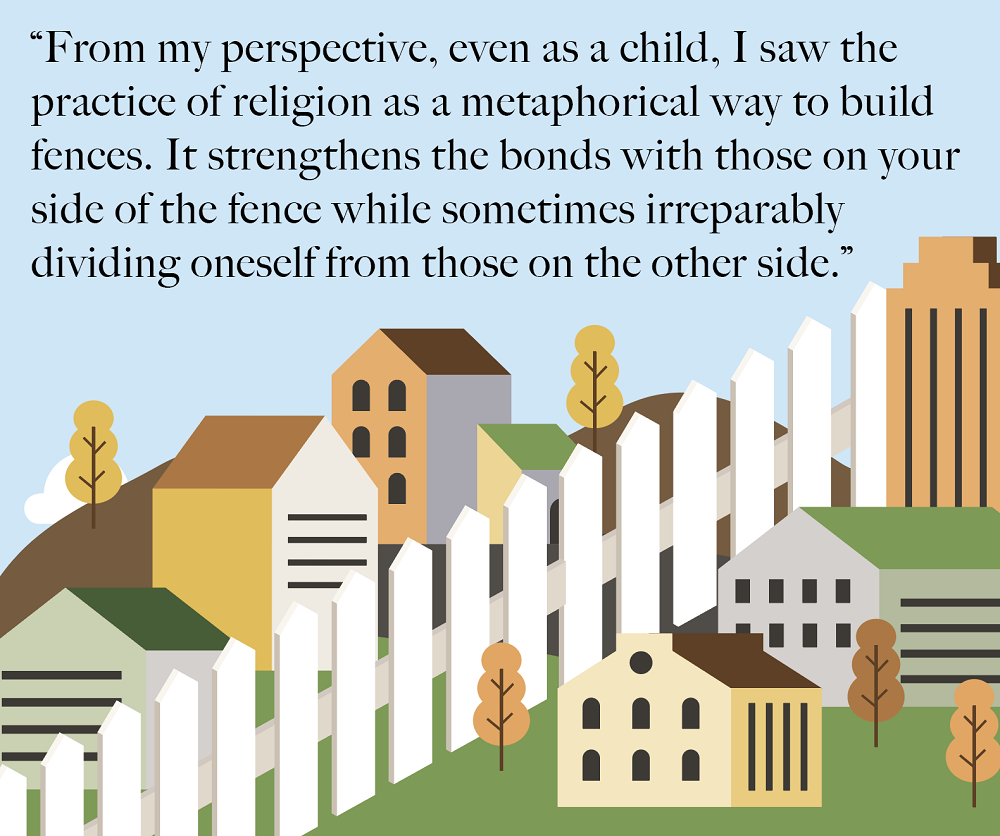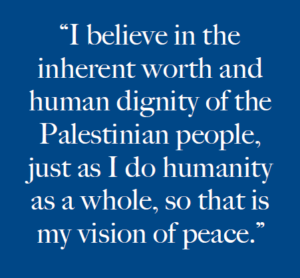Thoughts from a Palestinian Humanist

I COME BY HUMANISM HONESTLY. Growing up in Alabama where half of my family was evangelical, fundamentalist Baptist and the other half was Catholic, the two sides warred over who would get to save my wayward soul until I swore off religion entirely.
I saw people who were otherwise caring, thoughtful, and concerned with the well-being of their neighbors and community, made rabid by their beliefs and the conflicting beliefs of others. From my perspective, even as a child, I saw the practice of religion as a metaphorical way to build fences. It strengthens the bonds with those on your side of the fence while sometimes irreparably dividing oneself from those on the other side, even when both parties believe in the same deity.
Though I didn’t have the vocabulary to express it as a kid, I came to value individual people more than any spiritual connection, so I stopped going to church as soon as I moved out of my parent’s house at eighteen. With religion, I could easily opt out of the conflict over my soul by removing myself from the environments that were ripe for discord. As a conflict-averse person, that’s how I approached nearly every clash or dispute in my life—by avoiding them as much as humanly possible.
But there’s one area of my life in which I can’t avoid conflict because I can’t take an X-Acto knife to my strands of DNA, nor do I want to. I’m Palestinian. For some, the mere utterance of the word “Palestine” is enough to raise hackles. Sometimes, just saying “Palestine” is enough to garner accusations of anti-Semitism.
I have been in rooms where people have looked into my eyes and told me that Palestinians don’t exist. It’s easier to do with me than with many Palestinians because I don’t “look Middle Eastern”—another thing people are fond of saying to me. Even “Middle Eastern” is a Eurocentric descriptor of my people (Middle of what? East of where?). A more accurate descriptor is SWANA, or Southwest Asian and North African. Either way, I jokingly say I put the “palest” in Palestinian because I look as Anglo-Saxon as they come. I’m white with straight, light-brown hair and green eyes. Only other SWANA people have looked into my eyes and guessed my origins.
I have, too, been in rooms where people ask me about my last name, Shunnarah, and when I tell them it’s Palestinian, they respond in ignorant ways. I’ve been told “Maybe keep that to yourself,” or “I wouldn’t tell people that if I were you,” accompanied by a cringe as if my DNA is something to be ashamed of. I’ve heard it from everyone from my ex-boyfriends’ mothers to doctors, who might be expected to have been exposed to a wide variety of people. I’ve been asked a dozen or more times if I’m related to Osama bin Laden and Saddam Hussein. I was eleven when 9/11 happened and, for the next fifteen years, I was chosen for “randomly selected security searches” at every airport. If I dared ask how I’d been “randomly selected” so many times, they threatened to detain me for “failure to cooperate” even as I handed over my bags without delay. It wouldn’t surprise me if I were on a government watch list just for being born. For the first twenty-five years of my life, I don’t recall a single person who wasn’t SWANA or from somewhere in the Levant region reacting with anything other than disdain upon learning my ancestry.
Even in purportedly liberal circles like the Democratic Socialists of America (DSA), I’ve watched otherwise social justice-seeking, human rights-oriented people bend themselves into pretzels and perform staggering feats of mental gymnastics to justify why they’ll happily support every other cause except for Palestinians’ right to self-determination. My local DSA chapter is happy to have me advocating for housing justice and canvassing neighborhoods where affordable housing is threatened, as our city experiences a population boom and predatory luxury apartment developers seek profit over the well-being of longtime residents. But the moment I suggest a demonstration about justice for Palestinians whose neighborhoods, like Sheikh Jarrah and Masafar Yatta, are under threat of being razed by the Zionist occupation, the room goes quiet save one or two voices. Those who speak up with me, more often than not, are non-Zionist Jews, who I’ve found to be some of my best and truest allies. They, like me, wonder how a people who survived the Holocaust could want to perpetuate a holocaust against others.
Not counting these handfuls of unabashedly pro-Palestinian folks, I grow weary with fair-weather “comrades.” My capacity for tolerance and peace is constantly tested. Am I to seek peace and justice alongside “allies” who don’t care whether my family and I live or die? Am I to tolerate people who treat me with kindness up until the moment my ethnicity is revealed to them?
There’s something people need to understand about Palestinians. We can be Black, white, or brown, as well as Muslim, Christian, Jewish, or humanist. We defy convention and expectation. Before the Nakba, Palestinians and Jews lived together peaceably. After the Nakba—“The Catastrophe” in English, in 1948, in which 750,000+ Palestinians were exiled from their ancestral homeland to make room for the state of Israel—Palestinians came to live all over the world. There are, of course, Palestinians in Jordan, Syria, Lebanon, Saudi Arabia, Egypt, Kuwait, Qatar, Iraq, Yemen, and Libya, but also in Chile, which has the largest concentration of Palestinians outside the SWANA area. There are also populations of diasporic Palestinians in Honduras, Guatemala, Mexico, Germany, El Salvador, Brazil, Puerto Rico, Canada, Australia, and more. The United States has approximately 255,000 Palestinians, most of whom live in Detroit, Los Angeles, and Chicago. However, some, like my family, live in Birmingham, Alabama, which is where I was born. We are everywhere and, if you haven’t noticed, it’s probably because we’re too afraid to tell you. We don’t trust that you’ll react well.
What unites us is our ancestral ties to Palestine, both the land that remains in Palestinians’ hold and that which is occupied. Maps identify the latter as Israel, but I call it Occupied Palestine. Palestinians are indigenous to the land that is historic Palestine, regardless of who is on that land now. When I explain Palestinian issues to people who are unfamiliar with them, I explain it like this: “You know how white people landed in America and systematically committed genocide against Native Americans so they could push them out and steal their land? Yeah, that’s what the Zionist occupying forces do to Palestinians.”
More recently, Russia’s invasion of Ukraine has given me another talking point. Russia wants to annex Ukraine, but Ukrainians don’t want that, so Russia is invading, occupying, and murdering Ukrainians, so Ukrainians are fighting back in self-defense. Russia is to Israel as Ukraine is to Palestine. Our pleas are simple: Get off our land, leave us alone, and stop murdering us. When put that way, people can easily understand the issue at stake and why I can’t be silent about the plight of my people.
 I support Ukraine because I’m Palestinian, and to fail to recognize Ukrainians’ humanity would be hypocritical. I only wish everyone who supported Ukraine (who isn’t Palestinian) would recognize our humanity in the same way. I do not make the analogy between Palestine and Ukraine to suggest that Ukrainians are our competition or that their right to self-determination is somehow a threat to ours; neither is true. The analogy goes to show the world’s hypocrisy and racism. It is apparently easier to care about white people in Eastern Europe than it is to care about mostly brown people in SWANA.
I support Ukraine because I’m Palestinian, and to fail to recognize Ukrainians’ humanity would be hypocritical. I only wish everyone who supported Ukraine (who isn’t Palestinian) would recognize our humanity in the same way. I do not make the analogy between Palestine and Ukraine to suggest that Ukrainians are our competition or that their right to self-determination is somehow a threat to ours; neither is true. The analogy goes to show the world’s hypocrisy and racism. It is apparently easier to care about white people in Eastern Europe than it is to care about mostly brown people in SWANA.
I want a world in which Palestinians—and all people—can live freely and safely, without fear of occupation, military violence, and bombs. I want a world in which we are free to exist, where Palestinian children can grow up and grow old instead of being thrown in prison for months or years on end simply for opposing the demolition of their family homes and neighborhoods. I want a world in which Palestinians can travel freely instead of being relegated to territories like Gaza and the West Bank, which are overcrowded and under-resourced due to occupation. I want Palestinians to be treated with care and concern on the global stage and given a meaningful vote in the United Nations, not merely a symbolic one. I want bodily autonomy and basic human rights for Palestinians. I want my people to be given the same freedoms and privileges that so many others enjoy.
I believe in the inherent worth and human dignity of the Palestinian people, just as I do humanity as a whole, so that is my vision of peace. Yet some people would say these simple statements are promoting hate and would call me radical or even a terrorist. To some, my vision of peace is heard as a declaration of war.
I exhaust myself considering the ways in which peace fails us. Peace so often involves a concession or compromise. Is it possible to compromise when there is no logical or practical centrism? Palestinians would like to live on their ancestral land without being murdered, but Zionists do not want that. It has been nearly seventy-five years since the Nakba, and more and more land has been stolen from indigenous Palestinians. There is no “two-state solution” when an occupying army seeks to wipe what’s left of Palestinian territories from the map. As I write this, the Palestinian neighborhood of Masafar Yatta is being razed to build a military training camp and firing range for the Israeli military. Murdering and exiling the residents of a neighborhood so that you can better learn how to murder and exile more of those same people is particularly galling. As much as I want peace, I cannot imagine what that would look like in practicality.
It is easy for me, living in the United States, where such violent military occupation is not a daily reality and condition of my existence, to try to imagine a kumbaya moment. Is it a child crying on the steps of their house that could stop a military bulldozer in its destructive tracks? Is it a mother begging the soldiers not to take her only son because he threw a rock at a soldier who saw his body as nothing more than a moving target? History has shown that Palestinians have been dehumanized to the point that even the idea of loving one’s family and having sentimental ties to a home is beyond the realm of possibility for our people.
Many people smarter and more highly educated than I have tried to come up with solutions for peace, and all have failed. It would be naive of me to think I had the answers. All I have is questions and hope against hope that if peace is possible, it will come to pass before more people die.
There is something else I want people to understand about Palestinians specifically, as well as humanity at large: there is no such thing as reciprocal abuse. When I tell the story of when, during my freshman year, a college classmate pushed me up against the wall and tried to force himself on me and how I fought him off, people react as you might expect. They say, “Good for you for fighting back!” and “I’m glad you were able to fight him off!” Even if I hadn’t successfully fought him off, I imagine people would still be glad that I attempted to thwart my attacker. Self-defense is the expected and natural response to being attacked.
 Was I violent against my would-be rapist? Technically, yes. I kicked and punched and pushed and flailed in order to get away from him. I left him with scratches and bruises and a punch to the groin that I hope was painful enough to deter him from ever trying to rape another woman. My violence was not without cause; if he hadn’t tried to sexually assault me, I’d have had no inclination to harm him. To put it bluntly, he started it. Only the most rigid and staunch adherents to patriarchal standards of women’s behavior would say that defending myself was an inappropriate response. He abused me; I did not abuse him.
Was I violent against my would-be rapist? Technically, yes. I kicked and punched and pushed and flailed in order to get away from him. I left him with scratches and bruises and a punch to the groin that I hope was painful enough to deter him from ever trying to rape another woman. My violence was not without cause; if he hadn’t tried to sexually assault me, I’d have had no inclination to harm him. To put it bluntly, he started it. Only the most rigid and staunch adherents to patriarchal standards of women’s behavior would say that defending myself was an inappropriate response. He abused me; I did not abuse him.
This is the micro version of what I observe on a macro level happening in Palestine. Palestinians are demonized for throwing rocks and tossing pipe bombs at the Israeli military, yet this is their self-defense. When I hear people say that they won’t “pick a side” or the issue is “too complex to understand,” I ask them what lengths they would go to protect their children and defend their dwelling. I ask if they would stand idly by while their family, neighbors, and friends were brutalized, imprisoned, and murdered.
What I mean to ask in these questions is, why is their own capacity for suffering so much shallower than what they want my people’s capacity for suffering to be? Why, by nature of where they were born, do they expect some people to have to suffer but not others? Why do they not believe that everyone’s life has value and that human life is worth defending, regardless of their ethnicity or the conditions of their birth?
To be human is to love, and to love is to protect. To protect is an attempt to seek or preserve justice, and to pursue justice is to uphold human rights.
A common chant at protests in the United States is “no justice, no peace.” Where there is no justice, neither can there exist peace. I seek peace by pursuing justice because I believe my people are worth it. Our lives matter too. We need true allies who are willing to educate themselves and demand the protection of our basic human rights. We need friends who believe in our inherent worth and human dignity as a people. We need collaborators who aren’t afraid to speak up for us in rooms we aren’t in. We need people who understand that Palestine is not a dirty word and that a people having their own identity weaponized against them is a form of dehumanization, which is a step down the path of genocide.
